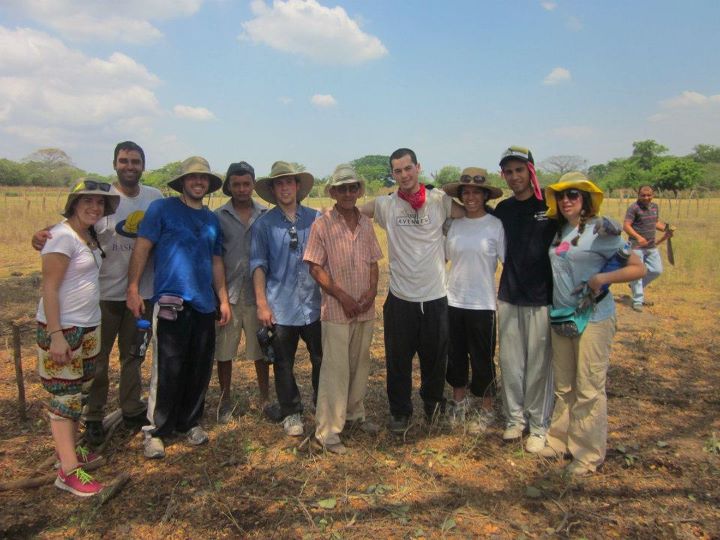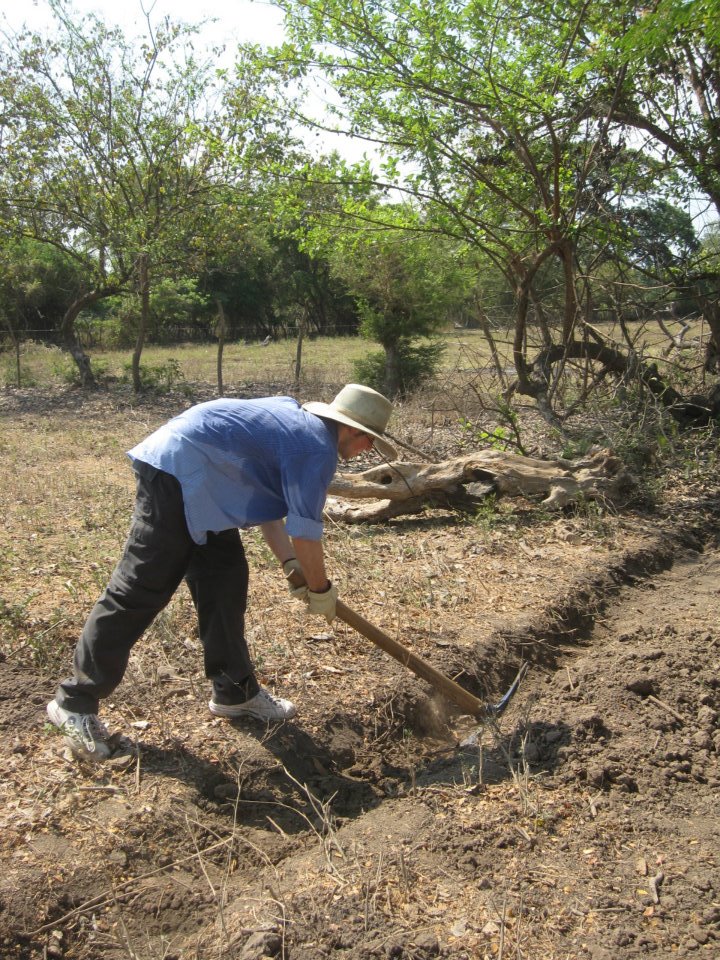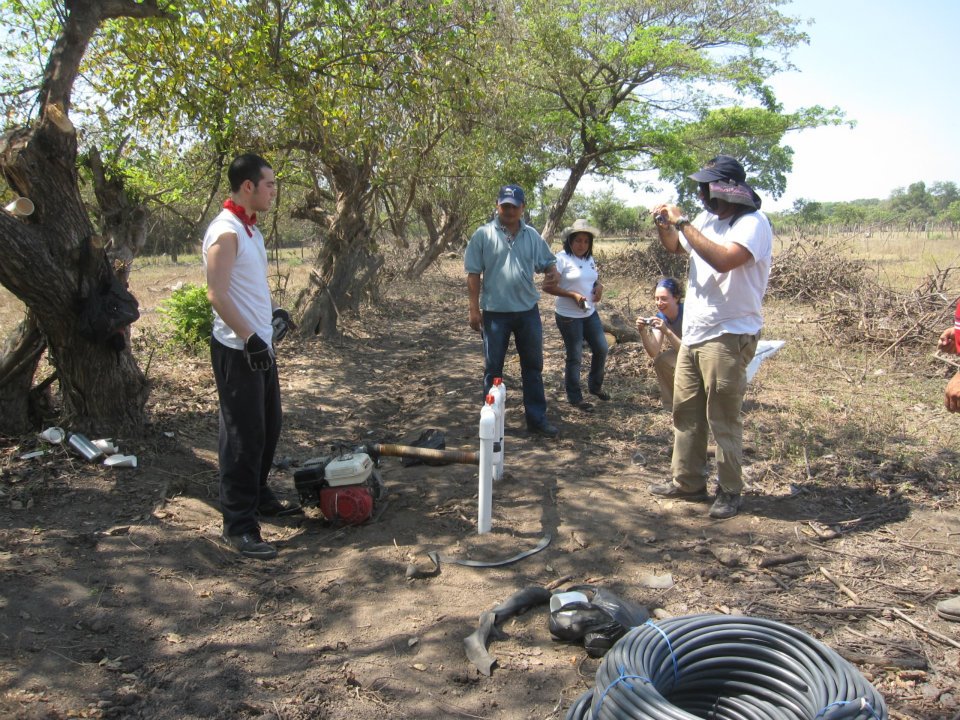Alternative Spring Break
What Is the Point of Service Trips to Less Developed Nations?

We dug ditches in the smoldering heat using shovels, hoes, and pickaxes. On Don Israel’s farm in the small village of Ciudad Romero, El Salvador, clad in work pants, gloves, and wide-brimmed hats, we were somewhat out of our element.
And with the sun approaching high noon, it was hard work digging even a few feet of a ditch that would hold piping for the irrigation system to be installed on the farm. Sydney Bennet – a first-year (now second-year) economics major at UCSB and “water-girl” for the day – called for everyone to take a break from working to hydrate.
We laid down our tools and, as we headed for our water bottles, the community leaders overseeing the irrigation project picked up the tools and continued work on the ditch. We watched them as they accomplished in a few minutes what had taken us an hour.
“I don’t get it,” said Sheila Ganjian, a fourth-year biology major at UCSB, who plans to go on to medical school next fall. “How are we helping? Why do they need us?”
These were pertinent questions, and ones volunteers on short-term service trips don’t always ask themselves. How does spending a week in a less developed country, doing work that could be better done by the people of that country, actually help? Wouldn’t the money spent traveling to that country be put to better use hiring native workers who desperately need the money, or building infrastructure that the community desperately needs?
A dozen students (including myself) recruited from UCSB and SBCC by Santa Barbara Hillel participated in this American Jewish World Service (AJWS) alternative spring-break trip to El Salvador this past March. The AJWS attempts to answer such questions by transforming the short-term, volunteer service trip into a learning experience. An organization inspired by Judaism’s commitment to social justice, AJWS strives to secure human rights and eradicate poverty around the world through service trips, education, political advocacy, and grant writing. Alternative spring-break trips are just one of the many service-learning travel opportunities offered by AJWS.
The motives were varied among the 12 of us volunteers. We wanted to see a different part of the world, have an opportunity to practice speaking Spanish, or simply spend a week doing something more meaningful than channel surfing.
We knew we were going to a small village in El Salvador to do some sort of manual labor, but I don’t think any of us were fully aware of the type of experience AJWS had in mind. During orientation meetings, we prepared for the physical labor, as well as the cultural aspects of the trip. Alexi Biener (senior engagement associate at Santa Barbara Hillel) and AJWS representative Lom Friedman led us in activities that were designed to stimulate our cultural awareness and encourage us to immerse ourselves in the village’s culture. Embrace the feeling of being uncomfortable, they told us.
Upon landing in San Salvador, we were greeted by our two AJWS group leaders – Rachel Weinstein and Andrew Carmona – as well as community leaders who would oversee our work project. Jose Maria Agueta (known as Chema to his friends) acted as our guardian, making sure the food we ate was safe and looking after our well-being. Chema had learned English while studying for several years in the United States on an international student scholarship. He was kind and friendly and had a modesty about him that quickly endeared him to the group. We also met Lolo, who would drive our van, and Wilfredo and Porfilio, who would provide us with instructions at the work site. The four of them made up the leadership team coordinating volunteer groups for La Coordinadora del Bajo Lempa (The Coordinating Committee of the Lower Lempa region), a grassroots organization in El Salvador founded in 1996.
Initially established to organize a flood-warning system in communities that suffered from the annual flooding of the Lempa River, La Coordinadora now engages in a wide range of projects pertaining to agricultural development, micro-credit loans, crop diversification, peace building, reforestation, and disaster response. Their projects are designed to help community members gain the skills necessary to become teachers in their communities, and their partnership with AJWS was born out of this common goal to not only provide aid to communities in need but also plant the seeds for sustained growth.
After a short meet and greet in the scorching heat that we would not get used to, we piled into the large van for an hour-and-a-half ride to Ciudad Romero. We settled into dorm-style accommodations that provided us with cold running water and latrines, many of which would be occupied at night by rather large entomological visitors.

Each day we were bused over to the farm and given tools to dig irrigation-pipe ditches, as well as holes for mango trees to be planted. We woke up before 7 a.m. for breakfast and were at the work site from 8 a.m. until noon, by which time it became way too hot to be working outside.
Our meals were provided by the homes of Marselena and Maribelle, volunteers from the village kind enough to cook for us and even teach us how to make pupusas, a corn tortilla stuffed with beans that is the trademark food of El Salvador. Don Israel was awarded the irrigation system by La Coordinadora for his hard work in the community. It cost $2,000 to install. It is rare to see a work project to completion on an AJWS spring-break trip, but we were fortunate enough to see the entire process of irrigating a farm.
From AJWS’s point of view, however, the crux of the trip lay not in the manual labor but in afternoon and nightly discussion sessions aimed at getting us to reflect on our experiences and explore the meaning of social justice. Using as our guide a curriculum filled with Jewish texts and commentaries on global responsibility, we questioned our notions about global inequality and what our obligation really is to those in the world who are poorer than us. We learned about what it means to be in poverty, its causes, and ways that we can help improve the quality of living for those living in poverty.
Through group dialogues we gradually came to understand that coming to El Salvador just to dig a few holes wasn’t doing enough. Rather, we’d be doing a greater good by learning as much as we could about the village and what makes it tick, what the biggest concerns are of its people and how they can thrive.

Our group study and discussions translated into our actions in the community. We asked questions on the farm about the country’s agricultural system, and Wilfredo and Porfilio were more than happy to explain – through the translation of Aaron Voit, a fourth-year Spanish and communications double major at UCSB – how they are working to improve farming by teaching farmers about crop diversification and about using cheaper organic fertilizers. We spoke with village leaders about the history of the people there and the 10-year civil war that ended the brutal feudal system of land ownership in El Salvador. We engaged members of the community and made meaningful connections. Even those of us who couldn’t speak a lick of Spanish communicated with villagers through the universal language of hand gestures and pointing.
As the week progressed, we began to develop a sense of the daily concerns of the village, not the least of which is U.S. policy toward Latin America. Triggered by a question from Rachel about DR-CAFTA, Wilfredo spoke at length about how the U.S. free-trade agreement with Central America had played a role in flooding El Salvador’s economy with foreign goods and creating problems for farmers. When asked if people in the village could feel directly the effects of U.S. policies, Wilfredo answered unequivocally, “Yes.” We were also fortunate enough to meet with Estela Hernandez, a woman from the Lempa river valley deeply involved in the work of La Coordinadora who was elected to the Salvadoran legislature a few weeks before our trip. When asked about her top political goals for her term in office, Estela responded that her top priority is to alert other nations – the U.S. in particular – to the issues affecting her people, and that she was grateful to have students from the U.S. come to learn about her community.
These experiences helped drive home the point that we were there not to simply visit and then leave but to bring back with us what we had learned and continue to help by gathering support for a just U.S. Farm Bill that promotes food sustainability in foreign countries as opposed to food aid, a short-term fix that undercuts local farmers.
But not everyone was as grateful to have us there as Estella was. A sobering moment on the trip came when we visited a clinician’s office to learn about their health-care system and the kidney disease that affects a disproportionate number of workers in Central America. We sat in the clinician’s office and asked her an assortment of questions about how health care works in the village. She gave lengthy explanations on topics such as who the clinic serves, how she became a doctor, and what treatments she gives. When it came time for her to ask us questions, she only had one: “Why are you here?”
Our group leaders’ answers about service and learning did not seem to satisfy her. She responded that it was puzzling to her how we could come for only a week and expect to have any impact, that we could do more by staying longer and teaching the local youth about hygiene and sexually transmitted diseases. As we continued to struggle to give her an answer she liked, her piercing gaze slowly diminished us and broke our hearts.
Perhaps the clinician was right. Perhaps short-term volunteer trips are used more as an opportunity for us to travel the world than as a means to help. Perhaps we did not need to be in El Salvador in order to educate ourselves about poverty and social justice or even about global responsibility and farming. Yet each one of us was changed by the experience we had in the village. We went home feeling connected to El Salvador, to Ciudad Romero, to La Coordinadora, and to the people with whom we had spent each day.
It is a hard thing to know how to help people without meeting them. You cannot connect with a group of people or learn what makes a village breathe by reading a book. You need to go there, eat their food, sleep in people’s homes, and wake up to the sound of their roosters. You need to experience the work in the field they do on a daily basis, put your hands in their soil, and feel the singe of the sun.
As we said our good-byes, Wilfredo told us we were now part of their family and welcome back any time. Why did we go? Before the trip I wanted to help them because they needed it. Now I want to help them because they are my family.



